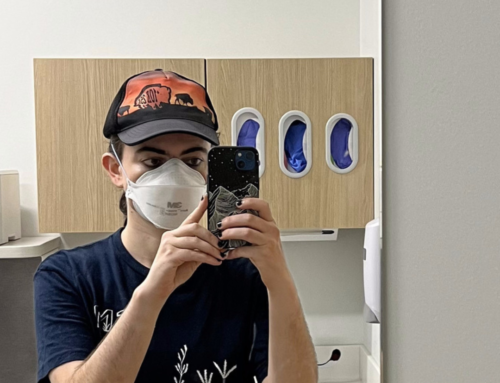How do you set boundaries when it can feel like changing the world requires laying yourself bare? When coming out as intersex and going public in the media with my own story as a teen, I didn’t know what I didn’t know. Fellow intersex advocates share the tips and boundaries they wish they’d had.
By Hans Lindahl
and interACT Youth Members

I’ll always remember a sweltering Chicago summer day I spent sipping smoothies across from one of my teenage idols.
As an intersex kid growing up in a sheltered suburb, I didn’t see anyone like me in the media, or anywhere else in my life. To my pleasant surprise, almost every time I asked, more experienced intersex advocates were glad to make time for conversations. On that day, I’d grabbed time with one I really admired between sessions at a conference. I know now that every person who is public-facing around advocacy for their identities is, of course, still simply a person. But as a teen who knew nothing about what it meant to speak out, getting time with someone who seemed more seasoned felt like seeing stars.
We chatted about life. They listened supportively to me describing the first public talk I’d ever given on intersex issues. I recall saying something to the effect of, “It went really well! Dozens of people wanted to ask questions afterward, so I stayed late.”
They chuckled and explained something that might have been casual to them, but hit me like a ton of bricks: for their own mental health, they planned how and when they would leave their speaking engagements—they limited others’ access to them.
… What?
Until that point, I had no idea that affecting social change could be compatible with boundaries.
I started off speaking about intersex issues with my personal story on my sleeve. Since then I’ve become much more guarded. I steer reporters to trends and macro issues over my own background. I keep mum about my own medical details on social media. I’m not the only one.
Whether you’re sharing your intersex experiences with friends on your personal social media accounts, or with the world, these tips from fellow advocates can help guard against burnout.
Understand what’s at stake when coming out as intersex—and not just for yourself.
No decision happens in a vacuum. Being public with your intersex status, whether on your own social media or in the media media, will affect others in your life.
“I wish they had told me that some of my family will cut ties,” said Alan K., who emphasizes that not all intersex advocates receive support. Some may face pushback from family members for airing “dirty laundry.” Parents, for example, may have complex feelings around the medical decisions they were forced to make for their children.
Ultimately, your story is yours to tell, if you decide that the benefits outweigh the costs. Still, disclosing always requires consideration of others. Every culture and community comes with its own unique considerations for disclosure.
Some people might hesitate to share openly because they don’t want to draw attention to siblings with the same intersex traits. Others may worry about violence or retaliation. Ultimately, your story is yours to tell, if you decide that the benefits outweigh the costs. Still, disclosing always requires consideration of others. Every culture and community comes with its own unique considerations for disclosure.
Even if you make the decision to share your story, you won’t know who your story will reach. The first quote I ever gave online was clickbait for a Cosmo article. Luckily, the website kept their sources anonymous—and that’s probably what gave me the guts to go for it. I learned early on that the internet is permanent.
If you use your real first and last name for advocacy, know that it will turn up in search results, and probably on the first page. That’s probably why many advocates and public figures use modified last names, first names only, or aliases. You’ll have to weigh whether or not you’re okay with your genital-related advocacy becoming a first impression for a future employer, date, etcetera. It’s certainly a conversation starter.
Set boundaries with advocacy work.
You don’t owe the world your story. In reality, sharing is a choice and a gift. Sometimes we give these gifts readily because we want to help others. But putting your own health first always pays off in the long term.
You don’t owe the world your story. In reality, sharing is a choice and a gift. Sometimes we give these gifts readily because we want to help others. But putting your own health first always pays off in the long term.
“Maybe you want the world to know every upsetting piece of your history. That might be beneficial for you, or for other people with the same problems,” Maddie Rose offered, with some caution, “Working through my surgery trauma in private first allowed me to separate painful details from the information I felt was beneficial to share.”
I know far too many young social justice advocates who dived head-first into sharing intimate details, only to face emotional whiplash months or years later. Sharing can be a part of healing. It also requires tight boundaries. Think about what information you might need to process for yourself first. This might shift over time.
Keeping some stock phrases in your back pocket can help. For example:
- “Please no questions on this post, but I’d love your support.”
- “I have 10 minutes for questions after my talk, then I’ve got to be at another meeting.”
- “My story is just one example of the bigger issue of (intersex people being denied choices) / (medical racism) / (a lack of health care options). We need to talk about that.”
If you speak about intersex issues beyond your own social circles, you never know what kind of negative attention might find you. With strong boundaries, you can keep focused on your story reaching the people who really need to hear it.
“Never read the comments,” offered Irene Kuzemko, who co-founded Intersex Russia and became one of just a few out intersex people in the Russian media. “Remember how many people you’re educating and how much good you’re doing by sharing your story.”
Identify your lane.
The chance to make a difference is exciting. There are still 24 hours in a day. If you choose to go public with intersex advocacy on a larger scale, there are countless opportunities. To increase your impact and save your sanity, pick a lane.
“When you’re just starting your journey into intersex advocacy, it can be incredibly easy to try everything at once. Being selective about which opportunities you take on, and being aware of your own capacity, is the best way to avoid burning out,” offered Mari Wrobi, an artist and advocate active in many social movements.
“Coming out publicly is really great for a lot of reasons. That said, it doesn’t solve everything,” said Elena Hight, a singer-songwriter public about their intersex status for 7 years, “I also wish someone had told me that the most important thing with intersex activism is do the type of thing you feel most comfortable with and feels most you.”
Not everyone is a front-and-center, camera-friendly kind of person, and that’s great! You’ll find a flavor of advocacy that feels right.
Maybe you want to create a support group in your community. Maybe you want to make progress for intersex people on the data science front. Or maybe you want to incorporate advocacy into your quilting practice. Connecting with others is a must during this process. Learning the landscape can lead to fruitful collaborations and friendships, plus faster progress when working together.
Know that you are in control.
Sometimes the best-kept secrets are hidden in plain sight. That is to say: you have much more control than you might think.
“Because so much of my intersex experience revolves around medical abuse and trauma, I felt like I wouldn’t be taken seriously compared to medical professionals. I learned over time that lived experience is incredibly valuable,” said Mari.
I got to know Mari when we lobbied together in support of interACT’s California bill to delay unnecessary infant genital surgeries. In reality, their story helped shape the course of meetings with several California legislators. Their presence in the room meant that decision makers had another face for the issue. When it came time to vote on the bill, medical opposition did all they could to argue that biased numbers and the distant authority of surgeons should rule over people’s own stories. But at the end of the day, those meetings earned votes for the bill and planted seeds for future conversations.
You get to decide what message you want to get across before going into an interview. You get to influence how stories are framed.
Similarly, if you choose to speak out in the media, it might feel like reporters hold all the cards. Again: you have much more control than you might think.
You get to decide what message you want to get across before going into an interview. You get to influence how stories are framed. If a reporter asks a question you are not comfortable with, you have tools. The pivot is a classic, as demonstrated by the legendary actress Laverne Cox. When Katie Couric asked her a prying question about gender-affirming surgery, she didn’t answer. Instead, she said what she needed to say, exposing the issue with the question. Remember, at the end of the day, the reporter asked to speak to you.
You can always request to preview any quotes before print, you can always specify in a phone interview if there is any information you’d prefer to keep “off the record,” and you can always request corrections after publication. Of course, not all reporters or outlets will respect their sources—and that reflects poorly on them. But you always have the power to ask.
Get comfortable with saying NO.
“When I first started off, I was eager to do every interview, take every opportunity,” recalled River Gallo, an artist and filmmaker quickly picking up steam with their project, Ponyboi. “I realized I’d spent 27 years not talking about being intersex, before I suddenly was speaking about it very openly in the media. A lot of vulnerability and trauma comes up every time. I wish someone had told me how important it is to rest, to take time to yourself, to recharge, and to set boundaries.”
As the landscape of intersex awareness changes, more and more people will reach out with opportunities—some safer and more effective than others. Always look into the background of people reaching out. Are they working with doctors advocating for infant genital surgery? Does their platform seem like it could reach the types of people you want to reach? Are they simply asking you to create free entertainment content for them? How much time and energy do you have available to give?
Asking yourself these honest questions will empower you to say NO when you need to. It’s all about creating an advocacy path that supports your health.
Don’t go alone.
Intersex advocacy in the United States has come a long way since its origins in the 1990s. Earlier generations did not have the internet to connect them. Improvements in technology made huge cuts to the amounts of shame and stigma faced by intersex people. Today’s advocates have global networks at their fingertips.
“I wish someone had told me that I would connect with intersex people from across the world when I came out!” said Courtney Skaggs, a recently out intersex person, who emphasized the importance of mentorship.
Resources exist, for mentorship and all sorts of connections. Check out interACT’s list of intersex groups by country, and our FAQ section listing publicly searchable Facebook groups.
As Irene of Intersex Russia says, “You will get a lot more love and support than you expect.”
This piece is part of the Intersex Awareness Day 2020 series on intersex health and resilience.








